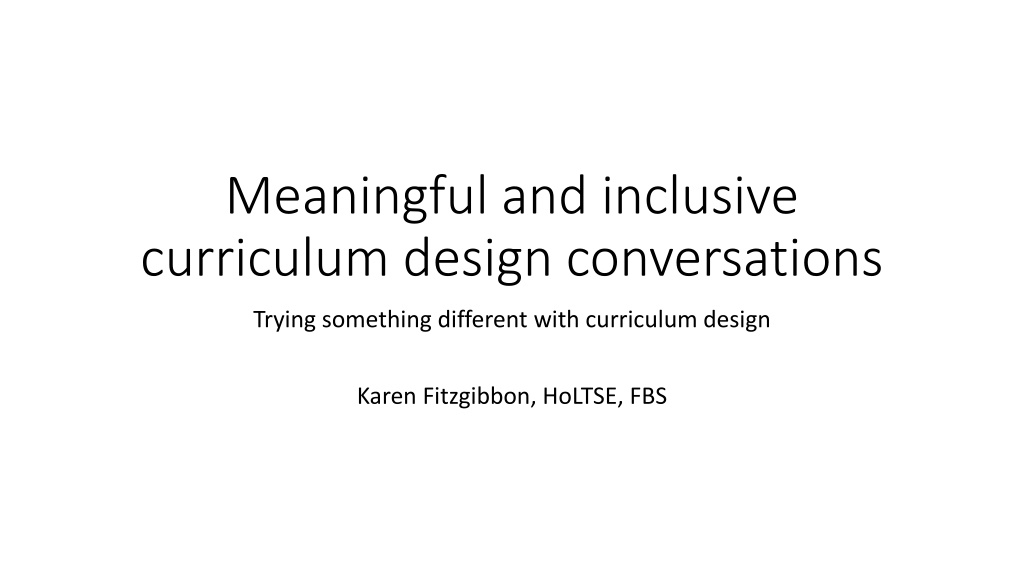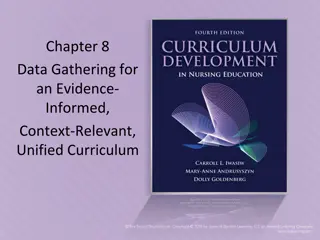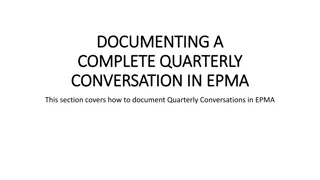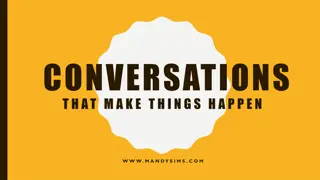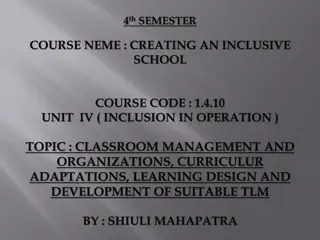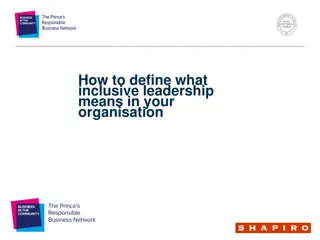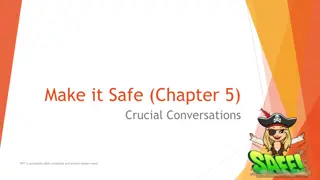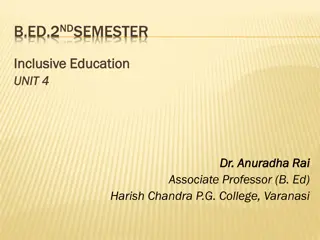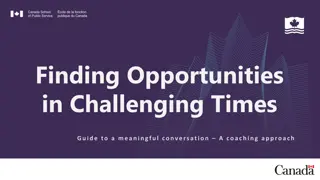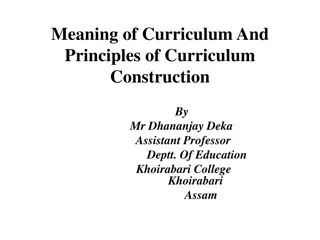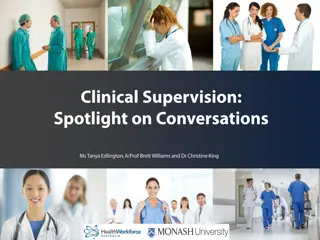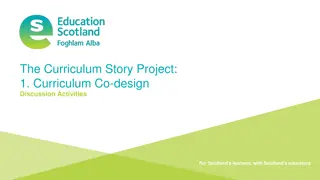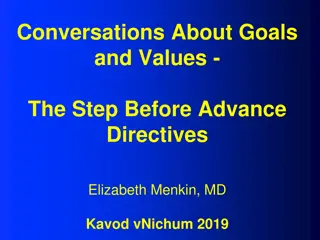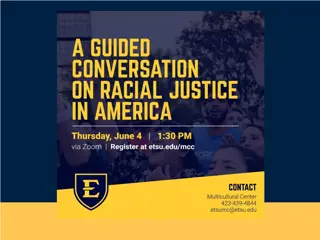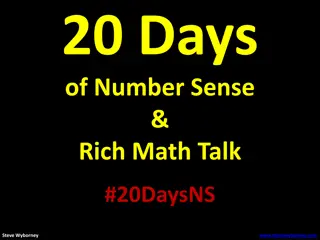Meaningful and inclusive curriculum design conversations
In a quest for meaningful and inclusive curriculum design, Karen Fitzgibbon explores a new approach to engage course teams in enhancing curriculum design. By addressing internal and external drivers for change, the aim is to facilitate inclusive conversations that promote learner-centered models and involve various stakeholders from the start. The approach includes workshops, flipped curriculum design methods, and a focus on student-centric and tutor-centric alignment strategies.
- Curriculum design
- Inclusive conversations
- Learner-centered
- Innovative approach
- Stakeholder engagement
Download Presentation

Please find below an Image/Link to download the presentation.
The content on the website is provided AS IS for your information and personal use only. It may not be sold, licensed, or shared on other websites without obtaining consent from the author. Download presentation by click this link. If you encounter any issues during the download, it is possible that the publisher has removed the file from their server.
E N D
Presentation Transcript
Meaningful and inclusive curriculum design conversations Trying something different with curriculum design Karen Fitzgibbon, HoLTSE, FBS
Drivers for change Internal A perceived need to separate QA processes from a genuine engagement with learning and teaching in a way that can be sustained External Competing with other institutions that are now recruiting in areas not traditionally considered as their patch Observation from pre-scrutiny panels of a traditional approach to learning, teaching and assessment in critical review and new course validation documentation. Courses with very few competitors in the market now experiencing a rise in those developing similar courses. The challenge of the VFM debate at both undergraduate and postgraduate level. Desire (on my part) to prompt a deeper review that is genuinely engaged with by the team. Awareness of the CMA and need to be able to clearly articulate the values, skills and technical knowledge graduates will achieve on completion of their studies. A desire to offer creative curriculum experiences where new and innovative courses are being designed.
Aims of the approach To engage course teams in an inclusive conversation to enhance curriculum design prior to (re)validation. To measure the effectiveness of the conversation activities by three outcome criteria - timeliness of documentation to Quality team; Standard of documentation for pre-scrutiny event; standard of provision measured through conditions, recommendations, commendations at (re)validation event. To develop course teams (including librarians and student reps) in the use of learner led/learner centred models of curriculum design. To engage professional service teams (Careers, Progression, Student Support) and Technology Enhanced Learning Partner right from the start of the conversations.
The approach Three hour (max) workshop introducing a flipped approach to curriculum design Course Team Faculty Librarian Technology Enhanced Learning Partner (CELT) Careers & Employability Partner Progression Team Partner Principal Quality Officer Touch points pre and post validation
Bartholomew & Curran (2018) tutor tutorcentric approach centric approachto curriculum alignment
Bartholomew & Curran (2018) student centric approach student centric approachto curriculum alignment
Selected participant views of the flipped model It opened my eyes to a different way of thinking. The flipped model makes you think about putting the student experience and their needs at the heart of curriculum design which gives you the confidence to progress with the development of the course. It allowed me to engage with wider perspectives around curriculum design and provided a logical journey, allowing me to have confidence in the emergent curriculum outcomes. I think this is an excellent model for thinking about the course, so as to break down and break out of pre-existing channels of thought, and 'think big' towards principled and creative ideas, rather than just operational planning. It allowed me to think of the students in a wider context rather than just the small part that I bring to table. Complete waste of time just doesn t work for my subject
What have participants continued to think about Course development can be a daunting prospect, particularly within such a rapidly changing educational environment. A workshop at an early stage which focuses on key issues is hugely beneficial to the process and builds confidence within the course team. Improving my course. The challenge of teaching resilience, This is such a core tool to have in your toolbox within today s environment, but also something which we are not used to teaching in the classroom. The input which the Careers & Employability Team could add to my course. Different ways that information literacy/research skills can be embedded. Also whether there is anything else I contribute to the course and how my contributions can better align with the course outcomes.
Outcomes did it work? Aims: To engage course teams in an inclusive conversation to enhance curriculum design prior to (re)validation. Results so far: Participants have rated the workshop 3.33 out of 4 for usefulness. To measure the effectiveness of the conversation activities by three outcome criteria - timeliness of documentation to Quality team; Standard of documentation for pre-scrutiny event; standard of provision measured through conditions, recommendations, commendations at (re)validation event. Documents on time; evidence of deeply considered curriculum and assessment; reduced number of conditions at validation events (and high number of commendations). The comments from the participants indicate that they have really taken this on board, continuing to think about it quite a while after the workshops. One subject area has run a similar workshop themselves proving the sustainability of the approach. To develop course teams (including librarians and student reps) in the use of learner led/learner centred models of curriculum design. To engage professional service teams (Careers, Progression, Student Support) and Technology Enhanced Learning Partner right from the start of the conversations. This has been one of the most powerful elements of the approach ongoing relationships have been strengthened.
If you would like to try it Contact: Karen Fitzgibbon. Faculty of Business & Society. Karen.Fitzgibbon@southwales.ac.uk
